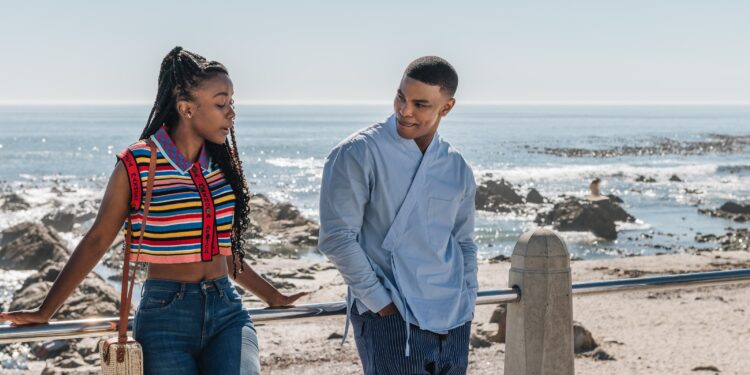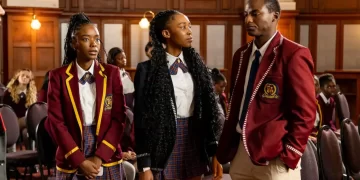Having only begun watching Blood & Water, a Netflix teen drama from South Africa, a few weeks ago, I expected an array of clichés and overindulgent egos, glittered with the affluent lifestyles of sex, drugs, and general bickering that seem to define the genre. The more I watched it, the more surprised I was that, though they are all prevalent, Blood & Water sinks deeper within itself to stir excitement and intrigue in places I didn’t think it had the courage to go. There is great attention to the characters and the general feel of every scene, which proves to be a surprise hit despite the unavoidable flaws that stem from the genre.
The first season starts us off through the lens of Puleng (played by Ama Qamata) and her family, wasting no time introducing us to the source of an enduring relentlessness that will carry her throughout the series. This giant 17-year-old silhouette hole right within the heart of the family becomes the foundation on which Blood & Water is built. Hellbent on a mission to find her missing sister, she leaves all the comforts and familiarity she has come to know all her life – from her best friend Zama (Cindy Mahlangu) to her school and even the trust in her own family – and jumps into the dangerous world of delusional rich kids of Parkhurst High and their powerful families. There she meets her most loyal trustee in Wade (Dillon Windvogel), falls in love with the suave KB (Thabang Molaba), locking horns with the head of the school magazine, Wendy (Natasha Thahane) and has to ward off the school’s jock Ackerman(Arno Greeff). All with the goal of deciphering if popular girl Fikile (Khosi Ngema) is her long-lost sister. This season is well contained within the scope of the school, playing out exactly how one would expect it to – full of corny dialogue, love triangles and rectangles, rivalries, and one-dimensional characters. However, there is enough care in the writing to flesh out the characters while keeping the events fresh and timely as they unfold. Even from the start, Blood & Water shows no fear in confronting subjects that other teen dramas shy away from, like teacher-student relations and the working hand of nepotism within schools and organizations. As our eyes and ears, Puleng helps us navigate both the dynamics of high school and the broadening scope of her investigation as it slowly uncovers.
The second season continues where the first left off, albeit from a broader angle. I reckon that with the first season’s success, the creators felt more confident in their ability to weave a narrative that could escape whatever boxes such a drama is supposed to fall into. I always worry about a show like this because everything will revolve around the initial conflict, in this case, the identity of the sister, and we will spend every season trying out twists over and over without ever having to answer it. Blood & Water confronts it early enough to allow season two to grow naturally with aligning and shifting allegiances, intentions, and motivations. The characters evolve more inward, with Puleng discovering hidden secrets within her family, KB coming to terms with who his father is, and Fikile discovering the truth about her origin. We also get an inner scope into the lives of other characters that were nothing more than walls to bounce dialogue against, like Ackerman and new cast Zayd (Alzavia Abraham’s). Some would argue that Blood & Water’s second season is the weakest link, and they wouldn’t be totally wrong, but watching all three seasons in such hurried succession, season two feels very important, like a conveyor belt of some sort, giving more depth to the characters, especially since the third season almost completely derails from the focus on high school drama the first season exists in.
The third and latest season is by far the best of the bunch. Like many dramas of this nature, the third instalment makes or breaks the show. There is almost a need to raise the stakes and their subsequent repercussions to ground familiar characters into more mature versions of themselves while building on the world around them in a seamless yet earned manner. This balancing act is hard to pull, breaking shows like Riverdale while exalting others like Sex Education. Blood & Water falls on the better side. The series stirs some school-based drama in the background with themes like bullying, bureaucracy, and long-distance relationships, but it’s clear that’s no longer where the intrigue is. Now, all attention is on the larger themes of grief, identity, parental influence, and, most importantly, a glimpse into the horrors of human trafficking. It’s a bet that is well-calculated and well-executed to stir tension while scarring the characters around each other. The show continues with its tradition of high schoolers abandoning everything to run around piecing together puzzles they shouldn’t be doing in the first place, though it’s more their proximity to the culprits than actual detective work most of the time. Long gone are the questions of the identity of Puleng’s sister or who is pulling the strings, and they are now replaced with questions about undercover police officers, underbelly syndicates, trauma, kidnappings, and murder.
There isn’t much wrong with Blood & Water season 3, especially as the episodes wind up. There are plot holes and character irregularities if you are looking for them, but for the most part, the show seems to be building on its stride. The music, fashion, scenery, and acting are, for the most part, exceptional, with the growth and depth the characters appear to have lived through since the beginning feeling natural and realistic. At least for the most part. Looking at you, KB.
To conclude, I have nothing but hesitant praise from Puleng and his gang. My only worry is that, with season 3 feeling more like a culmination than a cog in a bigger process, with the little bits of cliffhangers being overshadowed by the finality of plots that have been carried throughout the series, I can’t help but wonder if there is actually more to build on without tearing apart what has already been built. It is safe to say that if they continue to churn out more seasons, I will be one of the few waiting to see exactly from which angle they do that and with what level of success. I am, however, happy to be proved wrong as many times as I need to be.
Blood & Water S3 is now streaming on Netflix.
Enjoyed this article?
To receive the latest updates from Sinema Focus directly to your inbox, subscribe now.











